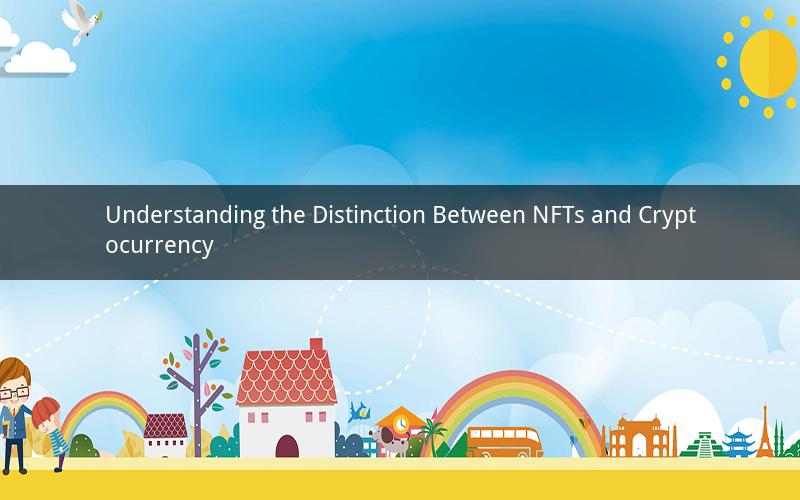
In the ever-evolving digital landscape, the terms "NFTs" and "cryptocurrency" often appear together, yet they represent distinct concepts. As the interest in digital assets continues to soar, many are left pondering: Are NFTs the same as cryptocurrency? This article delves into the differences and similarities between these two fascinating digital phenomena.
1. Definition of NFTs
Non-fungible tokens, or NFTs, are unique digital assets that are built on blockchain technology. Each NFT is distinct and cannot be exchanged on a one-to-one basis like fiat currency or cryptocurrencies. NFTs can represent ownership of digital art, music, collectibles, and more.
2. Definition of Cryptocurrency
Cryptocurrency, on the other hand, refers to digital or virtual currencies that use cryptography for security. The most well-known cryptocurrency is Bitcoin, but there are thousands of other cryptocurrencies, including Ethereum, Litecoin, and Dogecoin.
3. Ownership and Transferability
One of the primary differences between NFTs and cryptocurrency is ownership and transferability. With NFTs, ownership is established through the blockchain, and the token itself can be transferred from one person to another. Cryptocurrency, however, represents a fungible asset that can be traded on a one-to-one basis, with ownership transfer occurring through a digital wallet.
4. Purpose and Use Cases
NFTs and cryptocurrencies serve different purposes and have distinct use cases. NFTs are often used to represent ownership of digital art, collectibles, and other digital assets, while cryptocurrencies are primarily used for transactions, investment, and speculation.
5. Blockchain Technology
Both NFTs and cryptocurrencies rely on blockchain technology, which is a decentralized, secure, and transparent ledger of transactions. However, the way blockchain is used varies between NFTs and cryptocurrencies. In the case of NFTs, the blockchain is used to create and verify the uniqueness of each token. Cryptocurrencies, on the other hand, use blockchain to record transactions and maintain the value of the digital asset.
6. Market Performance
The market performance of NFTs and cryptocurrencies can vary significantly. NFTs have experienced a surge in popularity and value in recent years, with some digital artworks selling for millions of dollars. Cryptocurrencies, too, have seen their value fluctuate widely, with Bitcoin reaching an all-time high in 2021.
7. Security and Privacy
Both NFTs and cryptocurrencies offer a high level of security due to the use of blockchain technology. However, privacy concerns may arise when using NFTs, as the ownership and transaction history of each token are publicly available on the blockchain. Cryptocurrencies, on the other hand, can offer greater privacy through various privacy-focused technologies.
8. Regulatory Environment
The regulatory environment surrounding NFTs and cryptocurrencies continues to evolve. Governments and regulatory bodies are working to establish frameworks that address the risks and opportunities associated with these digital assets. As a result, the legal status and treatment of NFTs and cryptocurrencies can vary significantly by region.
9. Conclusion
In conclusion, while NFTs and cryptocurrencies share some similarities, such as their reliance on blockchain technology, they serve different purposes and have distinct characteristics. NFTs are unique digital assets used to represent ownership of digital art and collectibles, while cryptocurrencies are digital currencies used for transactions and investment.
10. Questions and Answers
Q1: Can NFTs be used as a medium of exchange like cryptocurrencies?
A1: No, NFTs cannot be used as a medium of exchange like cryptocurrencies. They are unique digital assets, and their primary purpose is to represent ownership of digital art, collectibles, and other digital assets.
Q2: Are all NFTs created equal?
A2: No, not all NFTs are created equal. The value of an NFT depends on various factors, such as the artist, the uniqueness of the digital asset, and the demand from collectors.
Q3: Can NFTs be converted into cryptocurrencies?
A3: In most cases, NFTs cannot be directly converted into cryptocurrencies. However, there are some platforms that allow users to trade NFTs for cryptocurrencies or vice versa.
Q4: Are NFTs more secure than cryptocurrencies?
A4: Both NFTs and cryptocurrencies offer a high level of security due to the use of blockchain technology. However, NFTs may be more vulnerable to privacy concerns, as the ownership and transaction history of each token are publicly available on the blockchain.
Q5: How do I invest in NFTs?
A5: To invest in NFTs, you'll need to create a digital wallet, such as MetaMask, and connect it to an NFT marketplace like OpenSea or Rarible. Once your wallet is set up, you can browse and purchase NFTs using cryptocurrencies like Ethereum.